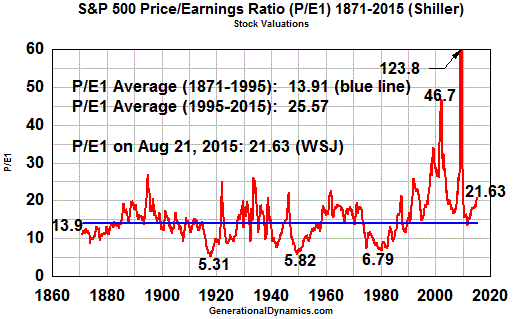Higgenbotham wrote:
> Over the past 3 months, I've noticed a lot of companies have
> reported stellar earnings, only to get beat up after a little bit
> of euphoria post report. I'm not saying that will continue to be
> the case. I think the question is at what point, if earnings
> remain stellar, do investors stop beating up companies that issue
> good earnings reports.
If stock shares are overpriced by 200%, and then earnings are stellar
so that they're only overpriced by 198%, then they're still
astronomically priced. Analysts on CNBC this afternoon have been
saying that investors are now questioning whether they should continue
to buy stocks with such high P/E ratios.
The S&P 500 P/E ratio on Friday was 24.51.
http://www.wsj.com/mdc/public/page/2_30 ... dc_h_usshl
Since the historical average is 14, that means that stocks were
overpriced by (24.51/14*100%)=175%.
If earnings are good in the next month, then the P/E ratio might
fall to, say, 20 -- which would mean that stocks would be
overpriced by "only" (20/14*100%)=142%.
That's still astronomically overpriced. This doesn't make any
rational sense, unless you view the stock market as a Ponzi scheme.
So the question is NOT "When will stocks be fairly priced?", because
that's never going to happen.
The question is: "What event will trigger a panic that will lead to a
crash?" This is not a question about rational thinking, because there
is no rational thinking. It's a question about sticking a balloon
with a pin. And we still don't know what triggered the 1929 panic.
By the way, the P/E ratio was around 20 when the October 1929 panic
occurred. It had come up from 17 earlier in the year, which suggests
that Q3 1929 earnings reports were not as good as expected. That
might have been the thing that triggered the panic.

